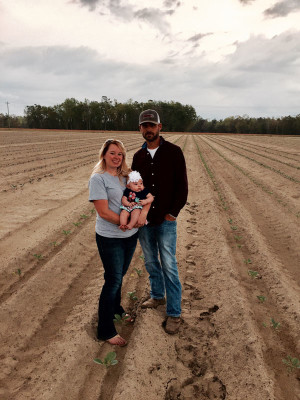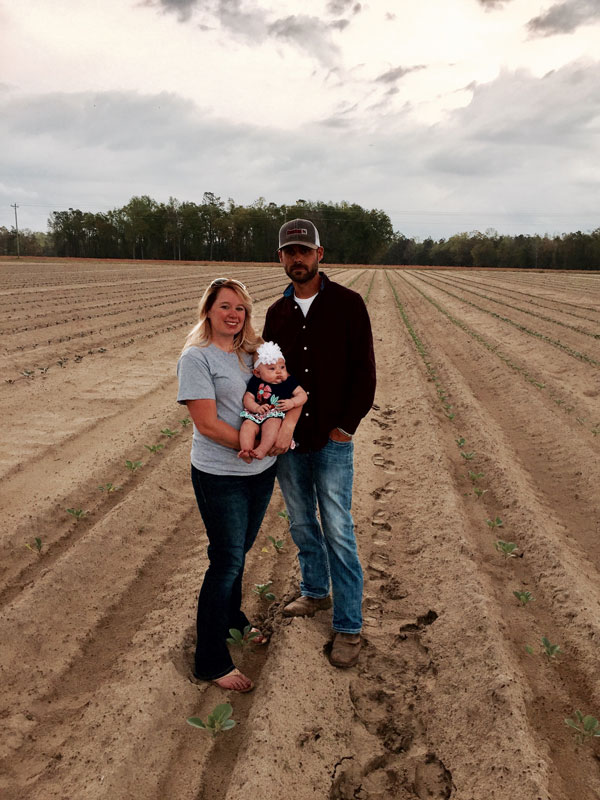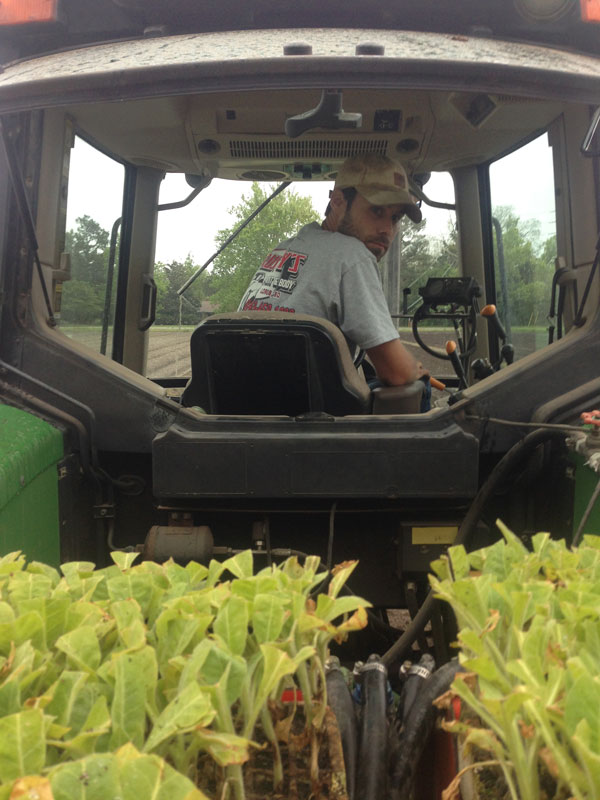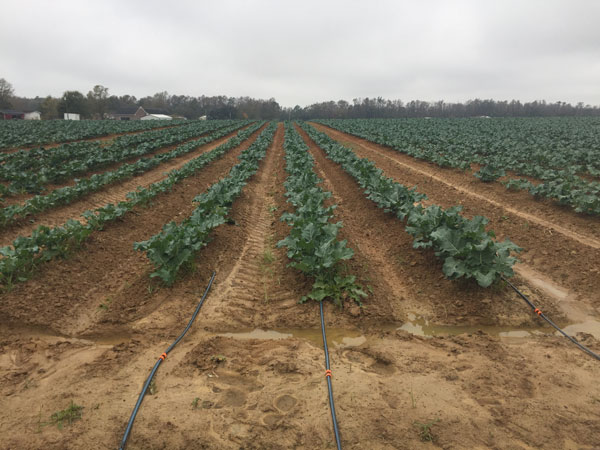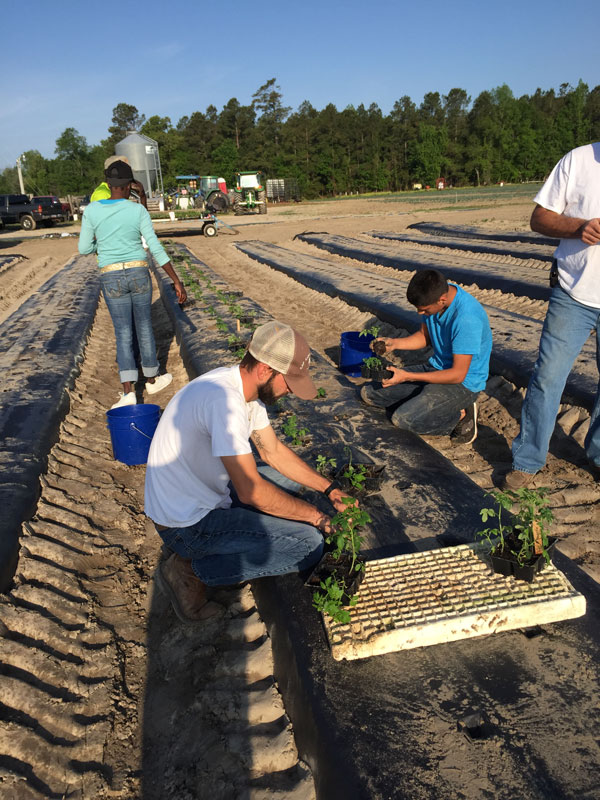by Stephanie Campbell, CFSA’s Outreach Coordinator
Jarrett Tyler grew up on Tyler Farms, the fifth generation on this land in Galivants Ferry, South Carolina. He and his twin sister, Whitley, loved being immersed in the family farm and life in this small community on the Pee Dee River just inland from Myrtle Beach. Jarrett spent summers working with his dad, Greg Tyler, in the fields. “What do I love best about farming?” Jarrett considers. “I enjoy being outdoors, the satisfaction of watching something grow, working as a family, and accomplishing something important.”
Handing down the farm from one generation to the next seems as American as apple pie. The younger generation has the advantage of learning how to farm seemingly by osmosis through years growing up on the farm and learning alongside the wise elders. There is a deep tie to and love for land which has been in the family for generations.
The average age of farmers nationally is 58.3 years old and fewer than 30 percent of farmers have identified a successor.
Current data, however, paints a different picture. In the mid-twentieth century 1 out of 3 Americans grew up on a farm. In 2016 less than 2% of the population farmed for a living. The Carolinas have lost almost a million and a half acres of farmland since mid-1990. The average age of farmers nationally is 58.3 years old and fewer than 30 percent of farmers have identified a successor.
Tyler Farms almost became one of those statistics. Greg and Jarrett’s story highlights some of the barriers which must be overcome and how CFSA is working to ensure that farmers have the training, resources and support they need to farm in new markets.
Give to CFSA to help us grow the next generation of organic farmers!
After high school Jarrett tried some off-farm work. His dad, Greg, quit farming tobacco in 2004 because he could no longer make a living at it. Tyler Farms seemed destined to join the statistics of failed family farms and lost farmland in the Carolinas. Jarrett, however, missed farming and convinced his dad to try again together. “I knew where my heart was and I just had to get Dad back into farming,” says Jarrett.
They grew peanuts in 2012, tobacco and peanuts in 2013, and then began growing organic tobacco for Santa Fe Natural Tobacco in 2015. To grow tobacco organically, a farmer has to rotate the tobacco crop, which takes a heavy toll on the land, with another organic crop.
Jarrett knew that the market for organic vegetables is expanding and he wanted to try to grow them. His vegetable business, Sandy Hill Organics, is the only USDA certified organic vegetable producer in the county. “We have generations of conventional farming friends in the area,” Greg says, “and they all think we are crazy.”
Jarrett and Greg began growing organic broccoli and cabbage. They quickly learned that in order to sell into wholesale markets, they needed to become certified in Good Agriculture Practices (GAP)/Good Handling Practice (GHP). GAP/GHP certification are buyer-driven, voluntary audits that verify that fruits and vegetables are produced, packed, handled, and stored as safely as possible to minimize risks of microbial food hazards, positioning small growers to compete with mainstream supply chains. Greg heard about a workshop being offered by CFSA at Greenbrier Farm in Greenville, SC, in November 2016.
“The GAP workshop and then the individualized on-farm consulting from CFSA was a lifesaver!” said Greg. Greg and Jarrett worked to thoroughly review and standardize all of their food handling practices and were successfully GAP certified in December 2016. They agree that, “Vegetable handling is so much more complicated than tobacco. We could not have passed our audit without this professional help from CFSA.”
Growing vegetables is one part of the business of farming, but finding good markets is another important piece. CFSA introduced Greg and Jarrett to GrowFood Carolina, a regional food hub which aggregates, markets and distributes source-identified food from local farmers to wholesale, retail and institutional markets. GrowFood provides local farmers the sales, marketing, logistics, warehousing and distribution functions they need that have previously been available only to large-scale industrial farms. CFSA helped the Coastal Conservation League launch GrowFood in 2011 and since its opening GrowFood has returned over $3 million to South Carolina farmers.
Jarrett’s farming business, Sandy Hill Organics, grows on about 6 acres now and his goal is to grow more varieties of vegetables on 20-30 acres in coming years. He has ideas about accessing the Farmers Markets nearby in Myrtle Beach and possibly selling on-farm someday. “It means a lot to me that my Dad feels comfortable turning the farm over to me,” says Jarrett. Greg echoes that, saying, “I always hoped Jarrett would be able to take over the farm and … carry on the tradition and care for the land.”
Jarrett’s wife, Ashley, had never farmed but now it is “all she wants to do” says Jarrett. “She helps with all the paperwork of the farm and hopefully, she can join the business full-time someday.” Jarrett and Ashley are new parents with a four month old daughter, Kayleigh, and they look forward to giving her a farming childhood and life. “Ashley and I live on the farm, my sister lives next door to Daddy across the street, and other family members live nearby. It’s the life we love,” says Jarrett.
“Organic farming is not easy,” says Jarrett, “but we hope it will provide us with a living.” He circles back around and emphasizes again what he loves about farming, “I love watching things grow; it makes you feel good, like you’ve done something important. We’re feeding America.”


